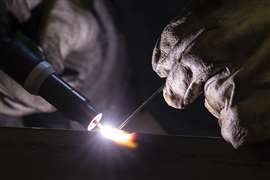Severfield’s welding defects affect HS2 and National Highways bridges
28 November 2024
The UK’s HS2 high-speed railway project and government-owned roads operator National Highways have announced that welding problems reported by the steelwork contractor Severfield on Tuesday 26 November have impacted a total of 14 bridges.

Structural steel contractor Severfield is facing over £20 million in testing and remedial costs after discovering welding issues in some of its bridge projects. The UK-based company found that certain bridge structures did not meet the welding specification requirements, according to its latest interim financial results.
During site works, HS2’s contractors identified a welding defect related to manufacturing at one factory. The issue affects sections of up to nine bridge and viaduct structures being built as part of HS2.
HS2 has disclosed that up to nine structures have been impacted, but so far, only three have been revealed. HS2 is said to be withholding the full list while “commercial negotiations regarding remedial work are ongoing”.
The three bridges named by HS2 are:
- Duddeston Mill Road bridge, Birmingham
- Princes Risborough to Aylesbury rail bridge, Aylesbury/Stoke. Mandeville
- Harvil Road bridge, Hillingdon
HS2 has confirmed that “remedial work has already been carried out to correct defects on a number of structures while work is ongoing elsewhere. All bridges placed into service have been thoroughly inspected and are safe to use.”
HS2 are working with the company responsible for the work to identify the root cause.
The five National Highways structures that are affected are:
- A30 Chiverton (Tolgroggan Accommodation East)
- A46 Binley Junction A428
- A454 Catherine De Barnes Lane South B4438
- M42 Solihull Road B4102
- A1 Allerdene Railway Replacement
A National Highways spokesperson said, “Safety is and always will be our top priority. We regularly carry out inspections on the structures we manage to make sure our network is safe and in good working order. We are carrying out targeted inspections on a small number of bridges to rule out any potential issues.
“These bridges remain safe to use. For any abnormal load movements, we have put restrictions in place as a precaution while we assess whether any further strengthening measures may be required.”
In its interim results published this week, Severfield said that it had identified some bridge structures that were not in compliance with weld specification requirements, “predominantly relating to twelve bridge projects” that are either ongoing or completed over the past four years.
The reason for the discrepancy between the 12 bridges mentioned by Severfield and the total of 14 listed by HS2 and National Highways is because remedial work required on two bridges is thought to be minor, according to a spokesperson for the company.
In its interim results, Severfield said, “The issues all arise out of a particular bridge specification and related sub-optimal choices of welding procedures, exacerbated by limitations in the specified weld testing regime for these projects. A comprehensive review is currently being undertaken by the group, in conjunction with its affected clients, relevant industry authorities and insurers to fully understand the extent of the actions required to resolve the issue, which has not affected the safety of any operational bridges.”
MAGAZINE
NEWSLETTER
CONNECT WITH THE TEAM






